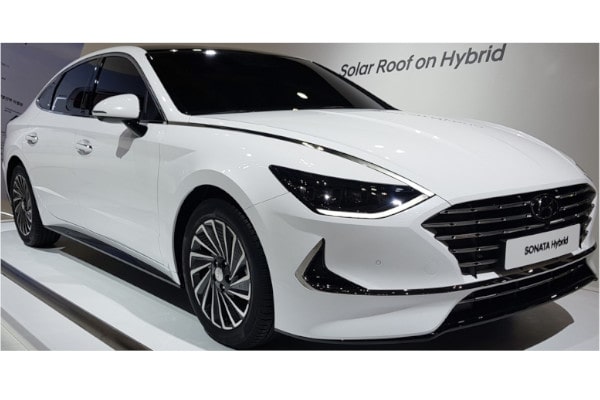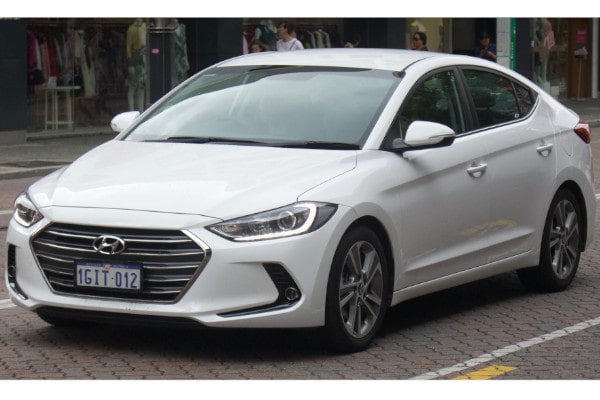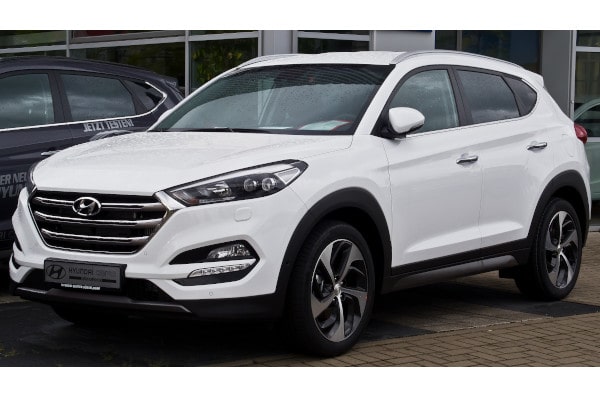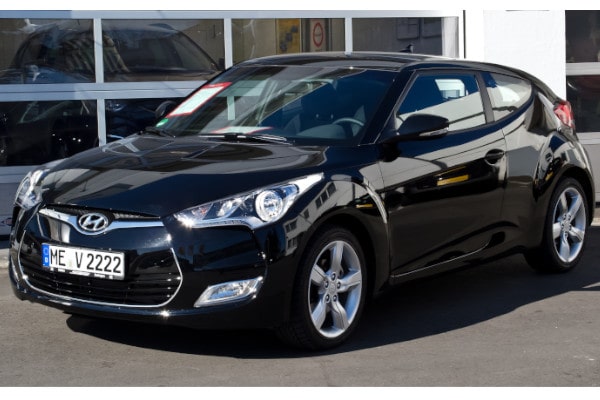Established in 1967 Hyundai Motor Company is a South Korean automobile manufacturer. With vehicles sold in more than 190 countries, it is the 3rd largest car brand in the world, with a total market share of 5.4%.
But does Hyundai hold its value after purchase? Why does it depreciate the most in the first year? And how old Hyundai should you buy? I am going to answer these questions in this article and will also summarize the depreciation of top Hyundai models.
Does Hyundai Keep Value?
Hyundai depreciates almost half of its value in the first 5 years of its operation. While an average car loses 50-60% of its initial value in the same period. So, Hyundai performs average when compared with other cars but still, it is far away from the top resale brands of the world and sits at number 11 in that list.
The below graph shows the average depreciation of Hyundai cars over the 12 years. After 5 years of operation, the residual value of Hyundai cars is 49.86% and it further drops to 17% after 12 years.

While the following illustration shows a year-to-year depreciation percentage of Hyundai cars. On average, Hyundai cars depreciate the most in the first, second, and fifth years.

Also read: Are Hyundai Good Cars? All You Need to Know
7 Popular Hyundai Models and Their Depreciation
Now let us dig deeper and look at the depreciation rate of 7 popular Hyundai models over 10 years.
1. Hyundai Sonata

Hyundai Sonata is a mid-size family sedan with multiple variants available in the market. It’s an FWD, has 5 seating, and comes with a fuel economy of 23-28 MPG.
Initial Selling Price: $28,600
Percentage Depreciation after 5 Years: 57%
Trending Video: How to Easily Bring Back to Life any Old Car Battery and Save Tons of Money (click to watch)
10-Year Depreciation Projection:
| Vehicle Age | Depreciation | Residual Value | Vehicle Worth |
| 1 | $6,349 | 77.80% | $22,252 |
| 2 | $9,533 | 66.67% | $19,068 |
| 3 | $11,283 | 60.55% | $17,318 |
| 4 | $12,865 | 55.02% | $15,736 |
| 5 | $16,277 | 43.09% | $12,324 |
| 6 | $16,480 | 42.38% | $12,121 |
| 7 | $17,186 | 39.91% | $11,415 |
| 8 | $19,211 | 32.83% | $9,390 |
| 9 | $20,822 | 27.20% | $7,779 |
| 10 | $21,165 | 26.00% | $7,436 |
2. Hyundai Accent

Hyundai Accent is a subcompact car with many intuitive tech features. It’s an FWD, has 5 seating, and comes with a fuel economy of 33 MPG.
Initial Selling Price: $17,514
Percentage Depreciation after 5 Years: 55%
10-Year Depreciation Projection:
| Vehicle Age | Depreciation | Residual Value | Vehicle Worth |
| 1 | $4,857 | 72.27% | $12,657 |
| 2 | $5,492 | 68.64% | $12,022 |
| 3 | $6,394 | 63.49% | $11,120 |
| 4 | $6,934 | 60.41% | $10,580 |
| 5 | $9,566 | 45.38% | $7,948 |
| 6 | $9,808 | 44.00% | $7,706 |
| 7 | $10,505 | 40.02% | $7,009 |
| 8 | $11,137 | 36.41% | $6,377 |
| 9 | $11,628 | 33.61% | $5,886 |
| 10 | $12,095 | 30.94% | $5,419 |
Also read: Mazda vs. Hyundai (Depreciation Compared!)
3. Hyundai Elantra

Hyundai Elantra is a compact car and comes with many safety and tech features. It’s an FWD, has 5 seating, and comes with a fuel economy of 25-33 MPG.
Initial Selling Price: $22,635
Percentage Depreciation after 5 Years: 47%
10-Year Depreciation Projection:
| Vehicle Age | Depreciation | Residual Value | Vehicle Worth |
| 1 | $5,417 | 76.07% | $17,218 |
| 2 | $7,646 | 66.22% | $14,989 |
| 3 | $8,149 | 64.00% | $14,486 |
| 4 | $8,355 | 63.09% | $14,280 |
| 5 | $10,704 | 52.71% | $11,931 |
| 6 | $12,617 | 44.26% | $10,018 |
| 7 | $13,316 | 41.17% | $9,319 |
| 8 | $13,964 | 38.31% | $8,671 |
| 9 | $14,260 | 37.00% | $8,375 |
| 10 | $15,609 | 31.04% | $7,026 |
Also read: Are Hyundai Parts Expensive? (with Exact Costs)
4. Hyundai IONIQ

Hyundai IONIQ is a compact five-door liftback car and is the most fuel-efficient hybrid vehicle to be ever produced in large numbers.
Initial Selling Price: $37,409
Percentage Depreciation after 5 Years: 54%
10-Year Depreciation Projection:
| Vehicle Age | Depreciation | Residual Value | Vehicle Worth |
| 1 | $8,402 | 77.54% | $29,007 |
| 2 | $13,647 | 63.52% | $23,762 |
| 3 | $15,790 | 57.79% | $21,619 |
| 4 | $18,349 | 50.95% | $19,060 |
| 5 | $20,350 | 45.60% | $17,059 |
| 6 | $23,639 | 36.81% | $13,770 |
| 7 | $24,746 | 33.85% | $12,663 |
| 8 | $27,122 | 27.50% | $10,287 |
| 9 | $27,211 | 27.26% | $10,198 |
| 10 | $28,812 | 22.98% | $8,597 |
5. Hyundai Kona

Hyundai Kona is a subcompact crossover SUV, with top-notch interior and user-friendly controls. It comes with both FWD and AWD, has 5 seating, and has a fuel economy of 27-30 MPG.
Initial Selling Price: $26,627
Percentage Depreciation after 5 Years: 47%
10-Year Depreciation Projection:
| Vehicle Age | Depreciation | Residual Value | Vehicle Worth |
| 1 | $7,488 | 71.88% | $19,139 |
| 2 | $9,048 | 66.02% | $17,579 |
| 3 | $9,660 | 63.72% | $16,967 |
| 4 | $10,819 | 59.37% | $15,808 |
| 5 | $12,619 | 52.61% | $14,008 |
| 6 | $14,325 | 46.20% | $12,302 |
| 7 | $15,734 | 40.91% | $10,893 |
| 8 | $16,213 | 39.11% | $10,414 |
| 9 | $17,084 | 35.84% | $9,543 |
| 10 | $19,065 | 28.40% | $7,562 |
Also read: What’s a High Mileage for a Hyundai? (The Facts)
6. Hyundai Tucson

Hyundai Tucson is a compact SUV class, has comfortable seats, and offers quite a gentle ride. It comes with both FWD and AWD, has 5 seats, and has a fuel economy of 21-23 MPG.
Initial Selling Price: $30,592
Percentage Depreciation after 5 Years: 45%
10-Year Depreciation Projection:
| Vehicle Age | Depreciation | Residual Value | Vehicle Worth |
| 1 | $8,734 | 71.45% | $21,858 |
| 2 | $10,741 | 64.89% | $19,851 |
| 3 | $11,319 | 63.00% | $19,273 |
| 4 | $11,977 | 60.85% | $18,615 |
| 5 | $13,785 | 54.94% | $16,807 |
| 6 | $15,871 | 48.12% | $14,721 |
| 7 | $18,881 | 38.28% | $11,711 |
| 8 | $19,019 | 37.83% | $11,573 |
| 9 | $19,710 | 35.57% | $10,882 |
| 10 | $22,075 | 27.84% | $8,517 |
7. Hyundai Veloster

Hyundai Veloster is a hatchback car and comes with a unique asymmetric door configuration. It’s an FWD, has seating for 4 people, and has a fuel economy of 20-28 MPG.
Initial Selling Price: $23,953
Percentage Depreciation after 5 Years: 56%
10-Year Depreciation Projection:
| Vehicle Age | Depreciation | Residual Value | Vehicle Worth |
| 1 | $4,930 | 79.42% | $19,023 |
| 2 | $8,740 | 63.51% | $15,213 |
| 3 | $9,627 | 59.81% | $14,326 |
| 4 | $11,325 | 52.72% | $12,628 |
| 5 | $13,486 | 43.70% | $10,467 |
| 6 | $14,283 | 40.37% | $9,670 |
| 7 | $16,300 | 31.95% | $7,653 |
| 8 | $16,874 | 29.55% | $7,079 |
| 9 | $17,423 | 27.26% | $6,530 |
| 10 | $18,449 | 22.98% | $5,504 |
Why Does Hyundai Depreciate the Most in the First Year?
One of the main reasons is the low demand for less than 2-year-old Hyundai cars in the market. Other factors also kick in to depreciate the price like it’s a Korean brand rather than a Japanese or German one, which has a long history of reliability and performance.
Another main reason is the release of a new variant every other year. Nobody wants to buy a year-old car when he or she can buy the latest model with some extra bucks. Therefore, most Hyundai cars lose almost 25% of their value in the first year alone.
How Old Hyundai Should You Buy not to Lose too Much Money?
In the ideal case scenario, one should buy an old Hyundai either after the second year or after the five years. As explained by the illustration in the start, Hyundai cars lose the most in the first two and fifth years of their lifespan.
In the first year, Hyundai will lose almost one-fourth of its value, a further 9 percent in the second year and almost 10% in the fifth year.
- If you buy a Hyundai car after 2 years, you can get it at 66% of the initial price with 83% of the vehicle useful life remaining.
- The second-best option would be buying a Hyundai car after 5 years, when you can get it at 50% of the initial price with 60% of the vehicle’s useful life remaining.
Also read: 3 Best Hyundais for Seniors (with Pictures)
How to Slow Down Your Hyundai Depreciation?
Below are some of the ways by which you can slow down your Hyundai depreciation and save some money:
- If you don’t plan to keep your vehicle for a long time then avoid buying a new car as it depreciates the most in the first year.
- Regularly maintain your vehicle and keep it in good condition for a better resale value.
- Try to buy a car with low mileage as the more mileage the car has the less it will be worth.
- Try to keep the total number of owners of a vehicle as minimum as possible. You can check this number using the logbook or V5C registration.
- Maintain the full-service history of your car as it’s a great way to reassure the new buyer that the car was well maintained.
How Well Do Hyundais Hold Their Value Compared to Other Car Brands?
When compared with other brands, Hyundai is not at par with other big companies and comes at number 11 in the list of top brands with the highest resale value. So, overall, Hyundai is below average when compared with other car brands.
Subaru and Toyota are the best brands that hold their value. Both of these brands lose only 35-40% of their value after 5 years. Brands like Honda, Mazda, GMC, and Ford also perform better than Hyundai in retaining their value. While brands like Nissan, KIA, and Mitsubishi are even worst performers than Hyundai in retaining their value.
References:
caredge.com, investopedia.com, laxmihyundai.com, en.wikipedia.org, statista.com, usnews.com, quora.com, sellyourcar2jack.com

